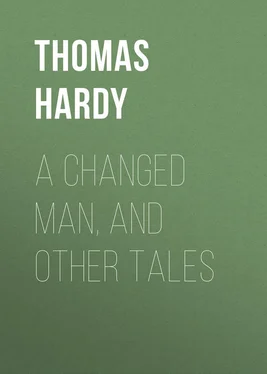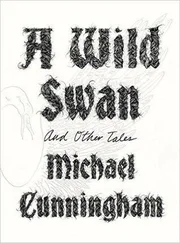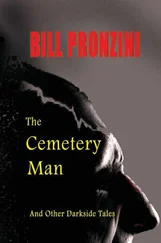Thomas Hardy - A Changed Man, and Other Tales
Здесь есть возможность читать онлайн «Thomas Hardy - A Changed Man, and Other Tales» — ознакомительный отрывок электронной книги совершенно бесплатно, а после прочтения отрывка купить полную версию. В некоторых случаях можно слушать аудио, скачать через торрент в формате fb2 и присутствует краткое содержание. Жанр: foreign_antique, foreign_prose, на английском языке. Описание произведения, (предисловие) а так же отзывы посетителей доступны на портале библиотеки ЛибКат.
- Название:A Changed Man, and Other Tales
- Автор:
- Жанр:
- Год:неизвестен
- ISBN:нет данных
- Рейтинг книги:4 / 5. Голосов: 1
-
Избранное:Добавить в избранное
- Отзывы:
-
Ваша оценка:
- 80
- 1
- 2
- 3
- 4
- 5
A Changed Man, and Other Tales: краткое содержание, описание и аннотация
Предлагаем к чтению аннотацию, описание, краткое содержание или предисловие (зависит от того, что написал сам автор книги «A Changed Man, and Other Tales»). Если вы не нашли необходимую информацию о книге — напишите в комментариях, мы постараемся отыскать её.
A Changed Man, and Other Tales — читать онлайн ознакомительный отрывок
Ниже представлен текст книги, разбитый по страницам. Система сохранения места последней прочитанной страницы, позволяет с удобством читать онлайн бесплатно книгу «A Changed Man, and Other Tales», без необходимости каждый раз заново искать на чём Вы остановились. Поставьте закладку, и сможете в любой момент перейти на страницу, на которой закончили чтение.
Интервал:
Закладка:
Two days later Nicholas was on the same spot in the mead, at almost the same hour of eve. But there was no fog now; a blusterous autumn wind had ousted the still, golden days and misty nights; and he was going, full of purpose, in the opposite direction. When he had last entered the mead he was an inhabitant of the Froom valley; in forty-eight hours he had severed himself from that spot as completely as if he had never belonged to it. All that appertained to him in the Froom valley now was circumscribed by the portmanteau in his hand.
In making his preparations for departure he had unconsciously held a faint, foolish hope that she would communicate with him and make up their estrangement in some soft womanly way. But she had given no signal, and it was too evident to him that her latest mood had grown to be her fixed one, proving how well founded had been his impulse to set her free.
He entered the Sallows, found his way in the dark to the garden-door of the house, slipped under it a note to tell her of his departure, and explaining its true reason to be a consciousness of her growing feeling that he was an encumbrance and a humiliation. Of the direction of his journey and of the date of his return he said nothing.
His course now took him into the high road, which he pursued for some miles in a north-easterly direction, still spinning the thread of sad inferences, and asking himself why he should ever return. At daybreak he stood on the hill above Shottsford-Forum, and awaited a coach which passed about this time along that highway towards Melchester and London.
CHAPTER VI
Some fifteen years after the date of the foregoing incidents, a man who had dwelt in far countries, and viewed many cities, arrived at Roy-Town, a roadside hamlet on the old western turnpike road, not five miles from Froom-Everard, and put up at the Buck’s Head, an isolated inn at that spot. He was still barely of middle age, but it could be seen that a haze of grey was settling upon the locks of his hair, and that his face had lost colour and curve, as if by exposure to bleaching climates and strange atmospheres, or from ailments incidental thereto. He seemed to observe little around him, by reason of the intrusion of his musings upon the scene. In truth Nicholas Long was just now the creature of old hopes and fears consequent upon his arrival – this man who once had not cared if his name were blotted out from that district. The evening light showed wistful lines which he could not smooth away by the worldling’s gloss of nonchalance that he had learnt to fling over his face.
The Buck’s Head was a somewhat unusual place for a man of this sort to choose as a house of sojourn in preference to some Casterbridge inn four miles further on. Before he left home it had been a lively old tavern at which High-flyers, and Heralds, and Tally-hoes had changed horses on their stages up and down the country; but now the house was rather cavernous and chilly, the stable-roofs were hollow-backed, the landlord was asthmatic, and the traffic gone.
He arrived in the afternoon, and when he had sent back the fly and was having a nondescript meal, he put a question to the waiting-maid with a mien of indifference.
‘Squire Everard, of Froom-Everard Manor, has been dead some years, I believe?’
She replied in the affirmative.
‘And are any of the family left there still?’
‘O no, bless you, sir! They sold the place years ago – Squire Everard’s son did – and went away. I’ve never heard where they went to. They came quite to nothing.’
‘Never heard anything of the young lady – the Squire’s daughter?’
‘No. You see ’twas before I came to these parts.’
When the waitress left the room, Nicholas pushed aside his plate and gazed out of the window. He was not going over into the Froom Valley altogether on Christine’s account, but she had greatly animated his motive in coming that way. Anyhow he would push on there now that he was so near, and not ask questions here where he was liable to be wrongly informed. The fundamental inquiry he had not ventured to make – whether Christine had married before the family went away. He had abstained because of an absurd dread of extinguishing hopeful surmise. That the Everards had left their old home was bad enough intelligence for one day.
Rising from the table he put on his hat and went out, ascending towards the upland which divided this district from his native vale. The first familiar feature that met his eye was a little spot on the distant sky – a clump of trees standing on a barrow which surmounted a yet more remote upland – a point where, in his childhood, he had believed people could stand and see America. He reached the further verge of the plateau on which he had entered. Ah, there was the valley – a greenish-grey stretch of colour – still looking placid and serene, as though it had not much missed him. If Christine was no longer there, why should he pause over it this evening? His uncle and aunt were dead, and to-morrow would be soon enough to inquire for remoter relatives. Thus, disinclined to go further, he turned to retrace his way to the inn.
In the backward path he now perceived the figure of a woman, who had been walking at a distance behind him; and as she drew nearer he began to be startled. Surely, despite the variations introduced into that figure by changing years, its ground-lines were those of Christine?
Nicholas had been sentimental enough to write to Christine immediately on landing at Southampton a day or two before this, addressing his letter at a venture to the old house, and merely telling her that he planned to reach the Roy-Town inn on the present afternoon. The news of the scattering of the Everards had dissipated his hope of hearing of her; but here she was.
So they met – there, alone, on the open down by a pond, just as if the meeting had been carefully arranged.
She threw up her veil. She was still beautiful, though the years had touched her; a little more matronly – much more homely. Or was it only that he was much less homely now – a man of the world – the sense of homeliness being relative? Her face had grown to be pre-eminently of the sort that would be called interesting. Her habiliments were of a demure and sober cast, though she was one who had used to dress so airily and so gaily. Years had laid on a few shadows too in this.
‘I received your letter,’ she said, when the momentary embarrassment of their first approach had passed. ‘And I thought I would walk across the hills to-day, as it was fine. I have just called at the inn, and they told me you were out. I was now on my way homeward.’
He hardly listened to this, though he intently gazed at her. ‘Christine,’ he said, ‘one word. Are you free?’
‘I – I am in a certain sense,’ she replied, colouring.
The announcement had a magical effect. The intervening time between past and present closed up for him, and moved by an impulse which he had combated for fifteen years, he seized her two hands and drew her towards him.
She started back, and became almost a mere acquaintance. ‘I have to tell you,’ she gasped, ‘that I have – been married.’
Nicholas’s rose-coloured dream was immediately toned down to a greyish tinge.
‘I did not marry till many years after you had left,’ she continued in the humble tones of one confessing to a crime. ‘Oh Nic,’ she cried reproachfully, ‘how could you stay away so long?’
‘Whom did you marry?’
‘Mr. Bellston.’
‘I – ought to have expected it.’ He was going to add, ‘And is he dead?’ but he checked himself. Her dress unmistakably suggested widowhood; and she had said she was free.
‘I must now hasten home,’ said she. ‘I felt that, considering my shortcomings at our parting so many years ago, I owed you the initiative now.’
Читать дальшеИнтервал:
Закладка:
Похожие книги на «A Changed Man, and Other Tales»
Представляем Вашему вниманию похожие книги на «A Changed Man, and Other Tales» списком для выбора. Мы отобрали схожую по названию и смыслу литературу в надежде предоставить читателям больше вариантов отыскать новые, интересные, ещё непрочитанные произведения.
Обсуждение, отзывы о книге «A Changed Man, and Other Tales» и просто собственные мнения читателей. Оставьте ваши комментарии, напишите, что Вы думаете о произведении, его смысле или главных героях. Укажите что конкретно понравилось, а что нет, и почему Вы так считаете.












